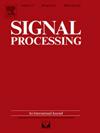利用超图卷积网络探索高光谱图像去噪的高阶相关性
IF 3.4
2区 工程技术
Q2 ENGINEERING, ELECTRICAL & ELECTRONIC
引用次数: 0
摘要
高阶相关性是高光谱图像(HSI)的一个重要特性,在基于模型的 HSI 去噪中得到了广泛研究。然而,现有的基于深度学习的高光谱去噪方法并未充分利用高阶相关性。超图卷积网络在捕捉高阶相关性方面表现出了巨大的潜力。因此,在本文中,我们提出了一种新颖的 HSI 去噪方法,利用超图卷积来表征补丁级的高阶相关性。具体来说,我们的框架是一个对称跳接的三维编码器-解码器架构,它增强了对局部特征的提取和利用。此外,为了将超图卷积模块有效地集成到三维框架中,我们设计了一个维度转换模块,以促进三维卷积和超图卷积的融合。值得注意的是,在超图卷积操作中,我们使用了数据驱动技术来获取超图的入射矩阵,从而有效地将 HSI 构建为高阶结构。与最先进的方法相比,我们提出的方法在 HSI 去噪性能方面表现出色,在合成和真实世界的高噪声 HSI 上进行的大量实验证明了这一点。本文章由计算机程序翻译,如有差异,请以英文原文为准。
Exploring high-order correlation for hyperspectral image denoising with hypergraph convolutional network
High-order correlation is an important property of hyperspectral images (HSIs) and has been widely investigated in model-based HSI denoising. However, the existing deep learning-based HSI denoising approaches have not fully utilized the high-order correlation. Hypergraph convolutional networks have shown great potential in capturing the high-order correlation. Therefore, in this paper, we propose a novel HSI denoising method by employing hypergraph convolution to characterize the high-order correlation at the patch level. Specifically, our framework is a symmetrically skip-connected 3D encoder–decoder architecture, which enhances the extraction and utilization of local features. Furthermore, to integrate competently the hypergraph convolutional modules into the 3D framework, we devise a dimensional transformation module that facilitates the fusion of 3D convolution and hypergraph convolution. Notably, in the hypergraph convolution operation, we use a data-driven technique to acquire the incidence matrix of a hypergraph, efficiently constructing the HSI into a high-order structure. Our proposed method excels in HSI denoising performance compared to state-of-the-art approaches, evidenced by extensive experiments on synthetic and real-world noisy HSIs.
求助全文
通过发布文献求助,成功后即可免费获取论文全文。
去求助
来源期刊

Signal Processing
工程技术-工程:电子与电气
CiteScore
9.20
自引率
9.10%
发文量
309
审稿时长
41 days
期刊介绍:
Signal Processing incorporates all aspects of the theory and practice of signal processing. It features original research work, tutorial and review articles, and accounts of practical developments. It is intended for a rapid dissemination of knowledge and experience to engineers and scientists working in the research, development or practical application of signal processing.
Subject areas covered by the journal include: Signal Theory; Stochastic Processes; Detection and Estimation; Spectral Analysis; Filtering; Signal Processing Systems; Software Developments; Image Processing; Pattern Recognition; Optical Signal Processing; Digital Signal Processing; Multi-dimensional Signal Processing; Communication Signal Processing; Biomedical Signal Processing; Geophysical and Astrophysical Signal Processing; Earth Resources Signal Processing; Acoustic and Vibration Signal Processing; Data Processing; Remote Sensing; Signal Processing Technology; Radar Signal Processing; Sonar Signal Processing; Industrial Applications; New Applications.
 求助内容:
求助内容: 应助结果提醒方式:
应助结果提醒方式:


